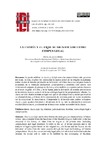La charía y el fiqh: su significado como corpus legal

Ver/
Use este enlace para citar
http://hdl.handle.net/2183/21750
A non ser que se indique outra cousa, a licenza do ítem descríbese como Atribución-NoComercial 3.0 España
Coleccións
Metadatos
Mostrar o rexistro completo do ítemTítulo
La charía y el fiqh: su significado como corpus legalAutor(es)
Data
2016Cita bibliográfica
Anuario da Facultade de Dereito da Universidade da Coruña, 2016, 20: 292-320. ISSN: 1138-039X
Resumo
[Resumen] Se puede calificar la charía y el fiqh como las características más genuinas
del islam, es más, muchos los consideran la espina dorsal de la religión musulmana;
ambas aluden al derecho producido en la historia del Islam desde sus orígenes hasta la
actualidad, en su totalidad (incluyendo jurisprudencia y doctrina). Este último hace
referencia al conjunto de preceptos divinos y a los análisis de expertos juristas basados
en el texto original, el Corán y en la Sunna, para la derivación de normas provenientes
de las mismas fuentes, a través de la metodología legal de la jurisprudencia islámica. La
charía no sólo abarca normativa legal sino que es un código ético y moral que muestra
la voluntad divina, y el deseo de la consecución de la misma, para ser puesta en práctica
por la comunidad de musulmanes. Comprender la diferencia entre ambos conceptos,
charía y fiqh, ayuda a fomentar el dinamismo de la ley para su adaptación a contextos
sociales determinados, y a desestimar afirmaciones hechas en nombre de la charía [Abstract] Sharia and fiqh can be described as the most genuine characteristics of Islam,
in fact, many consider them the backbone of the Muslim religion; both refer to the law
produced in the history of Islam from its origins to the present time (including
jurisprudence and legal doctrine). It refers to the set of divine precepts and to the
analysis of legal experts based on the original text, the Koran and the Sunna, for the
derivation of rules from the same sources through the legal methodology of Islamic
jurisprudence. Sharia law covers not only legal rules; it is an ethical and moral code that
presents the divine will in order to be fulfilled by the community of Muslims. Understanding the difference between the two concepts, sharia and fiqh, help to
promote the dynamism of the law to adapt to specific social contexts, and to dismiss
claims made on behalf of the sharia
Palabras chave
Charía-fiqh
Ley islámica
Jurisprudencia
Doctrina
Metodología legal e Interpretación
Sharia fiqh
Islamic law
Jurisprudence
Legal doctrine
Legal methodology and interpretation
Ley islámica
Jurisprudencia
Doctrina
Metodología legal e Interpretación
Sharia fiqh
Islamic law
Jurisprudence
Legal doctrine
Legal methodology and interpretation
Dereitos
Atribución-NoComercial 3.0 España
ISSN
1138-039X






